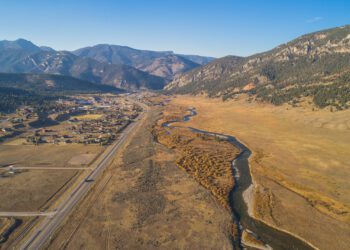Montanans can decide if their local governments are right for them
By Daniel Bierschwale EBS COLUMNIST
We just wrapped up the May 7 school and special purpose district election, and already there is another election on the horizon. The primary elections happen on Tuesday, June 4.
Traditionally, in a primary election, people choose which candidates will represent their party. This year in Montana, there is more at stake. First, let’s look at what this election is about.
Montana has an open primary system, which means that voters do not have to register with a specific party to participate in that party’s primary election. Voters can choose which party’s primary they wish to vote in on the day of the election.
Four ballots—is that a mistake?
Whether you vote at the polls or by absentee ballot, you will be given four different ballots—one for each of the parties: Democratic, Green, Libertarian and Republican. This is a result of open primaries and not a mistake by your county’s elections office. You will return just one ballot with your selections; the other three will be discarded.
The Study Commission question
This year, voters will get to decide on more than just their party nominations. A question that will appear on the ballot is whether voters would like a local government review.
This Local Government Review process was unprecedented in the United States and remains… arguably, one of the most important innovations in modernizing the performance and accountability of local government in the twentieth century (and beyond).”
– Dr. Kenneth Weaver, Montana’s Local Government Review
However, on the ballots, the question may not be very informative. It broadly asks voters to fill in the oval “For” or “Against” establishing and funding the review at a certain cost. (The Gallatin County website says that, on average, the cost to property owners would be less than $5.) But what is this and why is it important?
The Montana Constitution allows for county and municipal government to undergo a periodic review. Every ten years, citizens have the opportunity to say if they like their current structure, or if they would like to see alternate options that could make government more effective, more efficient or more affordable.

Specifically, the review would look at power, form and plan of local governments, which for Big Sky, would be Gallatin and Madison counties. This is not a policy or personnel review, where individuals are judged on how they are doing their jobs. For instance, it doesn’t look at a specific commissioner’s performance. Instead, it would look at the structure: Are there enough commissioners seated to accommodate community needs? Are terms long enough to ensure a smooth transition between candidates, or are terms too long and don’t allow for enough change in leadership? Is a position better served by an elected official who gets the most votes, or would it be better to hire a person who is trained in that specific area?
If the voters decide in favor of (“FOR”) the local government review, a study commission will be established. Regular citizens may file to be a study commissioner—seven in Gallatin County, three in Madison County. In the Nov. 5 general election, the electorate would vote on which community members they would like to lead this deeper dive into how things are run.
Once the study commission is elected, they will come up with a budget and plan for how to execute this study. They will spend the next 18 months reviewing the powers, structures, duties and limitations of governmental offices, and decide if they will chose either ‘no change’ or will make their recommendation to the voters in the November 2026 election. All recommendations would comply with Montana law.
The Local Government Center at the Montana State University Extension has more detailed information on their website about what is reviewed. They offer virtual hours on Fridays, May 17 and May 31 from 10 to 11 a.m. so voters can ask specific questions about this topic.
The local government review is a unique opportunity for Montanans to ensure that their local governments remain relevant as their communities grow. Whatever you decide, remember to get out there and vote.
Daniel Bierschwale is the Executive Director of the Big Sky Resort Area District (BSRAD). As a dedicated public servant, he is committed to increasing civic engagement and voter education. Many ballot issues impact government services and public funding including subsequent property tax impacts. BSRAD is the local government agency that administers Resort Tax, which offsets property taxes while also funding numerous community-wide nonprofit programs.











